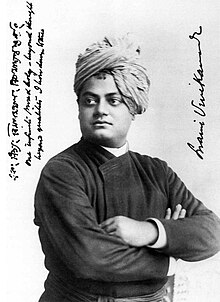Our website is made possible by displaying online advertisements to our visitors.
Please consider supporting us by disabling your ad blocker.
Swami Vivekananda
Vivekananda | |
|---|---|
স্বামী বিবেকানন্দ | |
 Vivekananda in Chicago, September 1893. In note on the left Vivekananda wrote: "One infinite pure and holy – beyond thought beyond qualities I bow down to thee".[1] | |
| Personal life | |
| Born | Narendranath Datta 12 January 1863 |
| Died | 4 July 1902 (aged 39) |
| Citizenship | British subject |
| Era | Modern philosophy |
| Region | Eastern philosophy |
| Alma mater | University of Calcutta (BA) |
| Signature | |
| Religious life | |
| Religion | Hinduism |
| Founder of | |
| Philosophy | Advaita Vedanta[2][3] Rāja Yoga[3] |
| School | |
| Lineage | Daśanāmi Sampradaya |
| Religious career | |
| Guru | Ramakrishna |
Influenced by | |
"Arise, awake, and stop not till the goal is reached"
(more on Wikiquote)
Swami Vivekananda[a] (12 January 1863 – 4 July 1902), born Narendranath Datta[b] was an Indian Hindu monk, philosopher, author, religious teacher, and the chief disciple of the Indian mystic Ramakrishna.[4][5] He was a key figure in the introduction of Vedanta and Yoga to the Western world.[6][7][8] He is credited with raising interfaith awareness and bringing Hinduism to the status of a major world religion in the late nineteenth century.[9]
Born into an aristocratic Bengali Kayastha family in Calcutta, Vivekananda was inclined from a young age towards religion and spirituality. At the age of 18 he met Ramakrishna, later becoming a devoted follower and sannyasin (renunciate). After the death of Ramakrishna, Vivekananda toured the Indian subcontinent as a wandering monk and acquired first-hand knowledge of the often terrible living conditions of Indian people in then British India. In 1893 he traveled to the United States where he participated in the Parliament of Religions in Chicago. Here he delivered a famous speech beginning with the words: "Sisters and brothers of America ..." introducing the ancient Hindu religious tradition to Americans and speaking forcefully about the essential unity of all spiritual paths, and the necessity of embracing tolerance and renouncing fanaticism.[10][11] The speech made an extraordinary impression. One American newspaper described him as "an orator by divine right and undoubtedly the greatest figure at the Parliament".[12]
After the great success of the Parliament, Vivekananda delivered hundreds of lectures across the United States, England, and Europe, disseminating the core tenets of Hindu philosophy. He founded the Vedanta Society of New York and the Vedanta Society of San Francisco (now Vedanta Society of Northern California),[13] which became the foundations for Vedanta Societies in the West. In India, he founded the Ramakrishna Math, which provides spiritual training for monastics and householders, and the Ramakrishna Mission, which provides charity, social work and education.[7]
Vivekananda was one of the most influential philosophers and social reformers in his contemporary India, and the most successful missionary of Vedanta to the Western world. He was also a major force in contemporary Hindu reform movements and contributed to the concept of nationalism in colonial India.[14] He is now widely regarded as one of the most influential people of modern India and a patriotic saint. His birthday is celebrated in India as National Youth Day.[15][16]
- ^ "World fair 1893 circulated photo". vivekananda.net. Archived from the original on 24 December 2023. Retrieved 6 October 2024.
- ^ "Bhajanānanda (2010), Four Basic Principles of Advaita Vedanta, p.3" (PDF). Retrieved 28 December 2019.
- ^ a b De Michelis 2005.
- ^ "Swami Vivekananda: A short biography". www.oneindia.com. Retrieved 3 May 2017.
- ^ "Life History & Teachings of Swami Vivekanand". Retrieved 3 May 2017.
- ^ "International Yoga Day: How Swami Vivekananda helped popularise the ancient Indian regimen in the West". 21 June 2017.
- ^ a b Feuerstein 2002, p. 600.
- ^ Syman, Stefanie (2010). The Subtle Body: The Story of Yoga in America. New York: Farrar, Straus, and Giroux. p. 59. ISBN 978-0-374-23676-2.
- ^ Clarke 2006, p. 209.
- ^ Barrows, John Henry (1893). The World's Parliament of Religions. The Parliament of Religions Publishing Company. p. 101.
- ^ Dutt 2005, p. 121.
- ^ "Sisters and brothers of America — full text of Swami Vivekananda's iconic Chicago speech". The Print. 4 July 2019.
- ^ Jackson 1994, p. 115.
- ^ Von Dense 1999, p. 191.
- ^ "Know About Swami Vivekananda on National Youth Day 2022". SA News Channel. 11 January 2022. Retrieved 12 January 2022.
- ^ "National Youth Day 2022: Images, Wishes, and Quotes by Swami Vivekananda That Continue to Inspire us Even Today!". News18. 12 January 2022. Retrieved 12 January 2022.
Cite error: There are <ref group=lower-alpha> tags or {{efn}} templates on this page, but the references will not show without a {{reflist|group=lower-alpha}} template or {{notelist}} template (see the help page).
Previous Page Next Page


